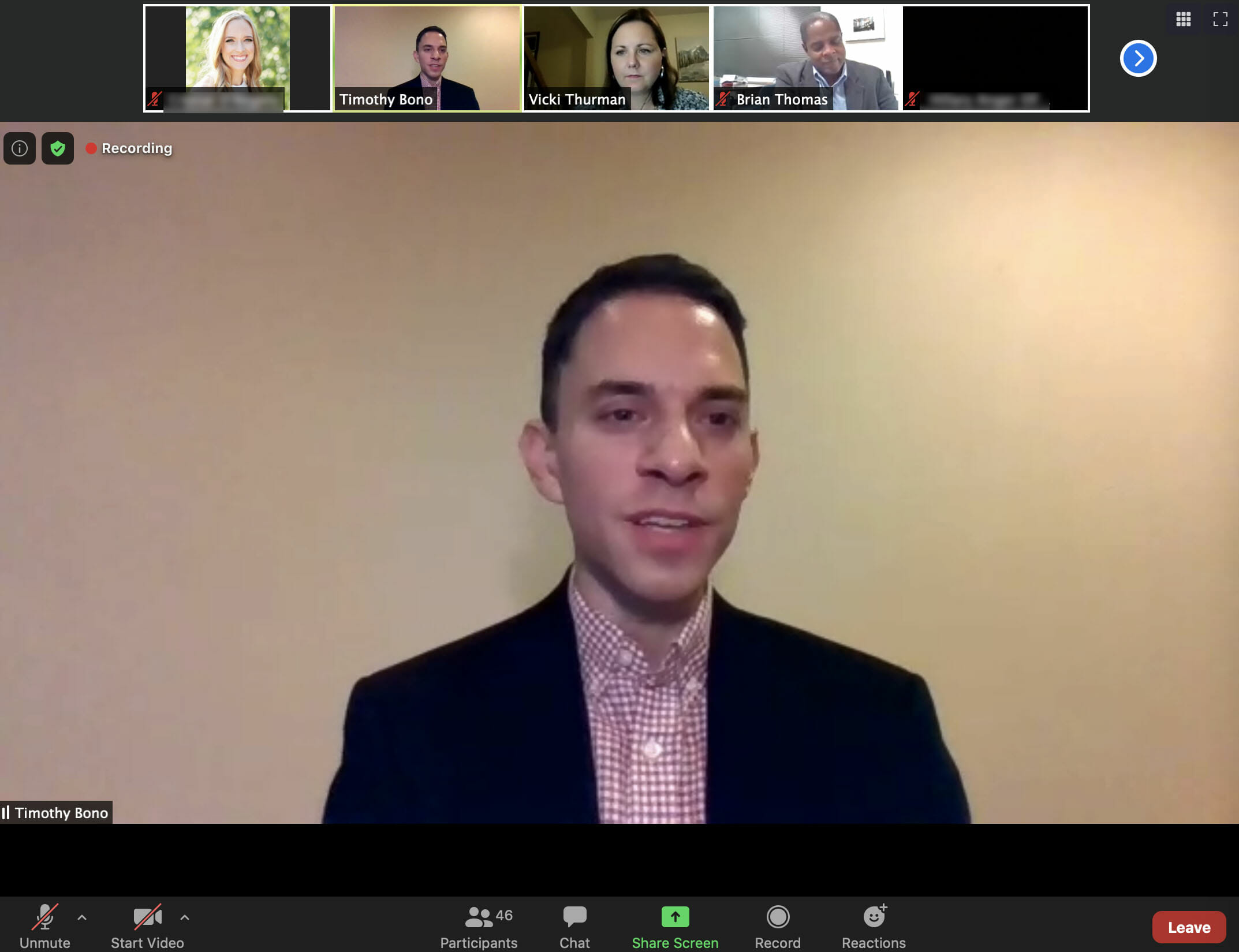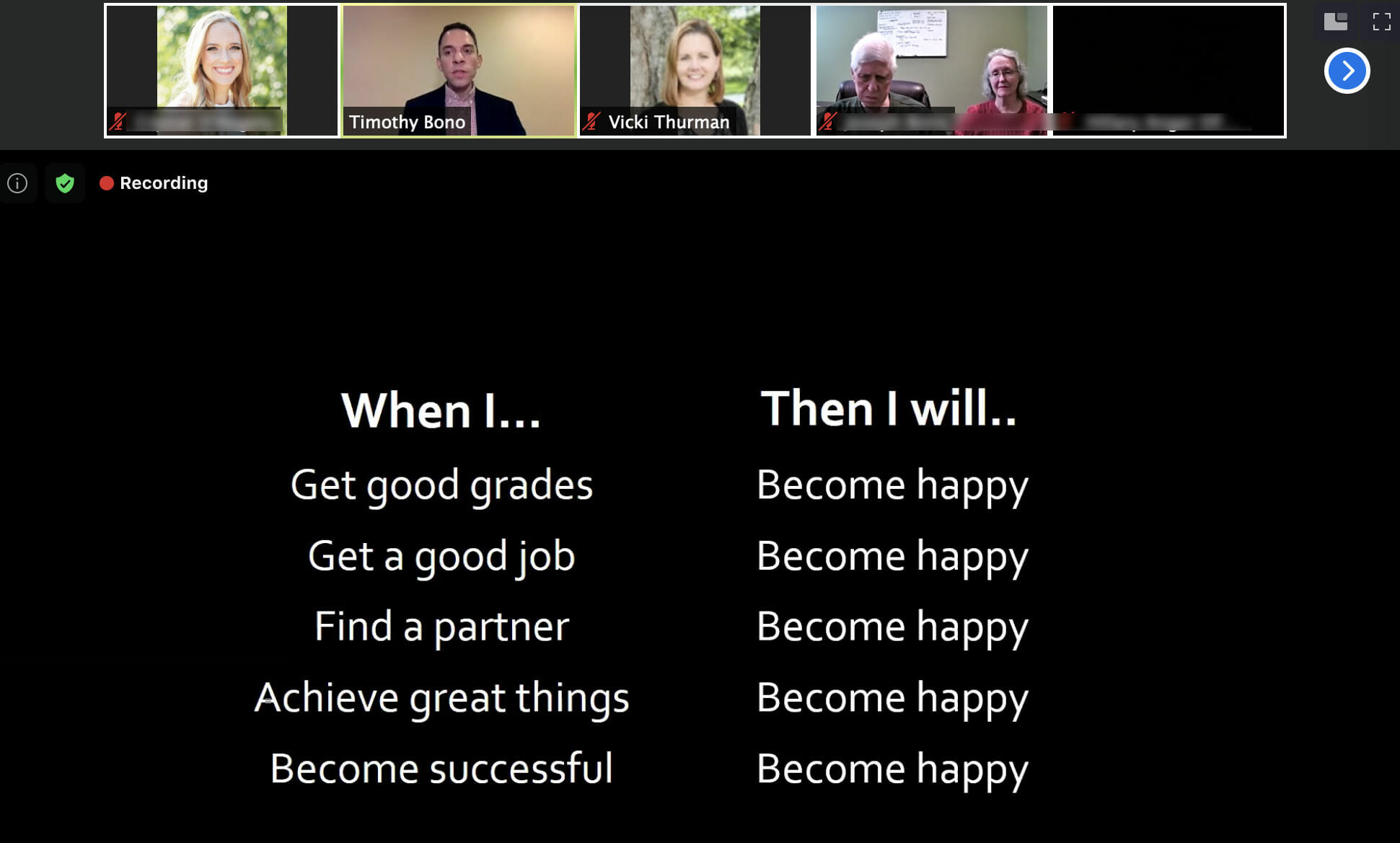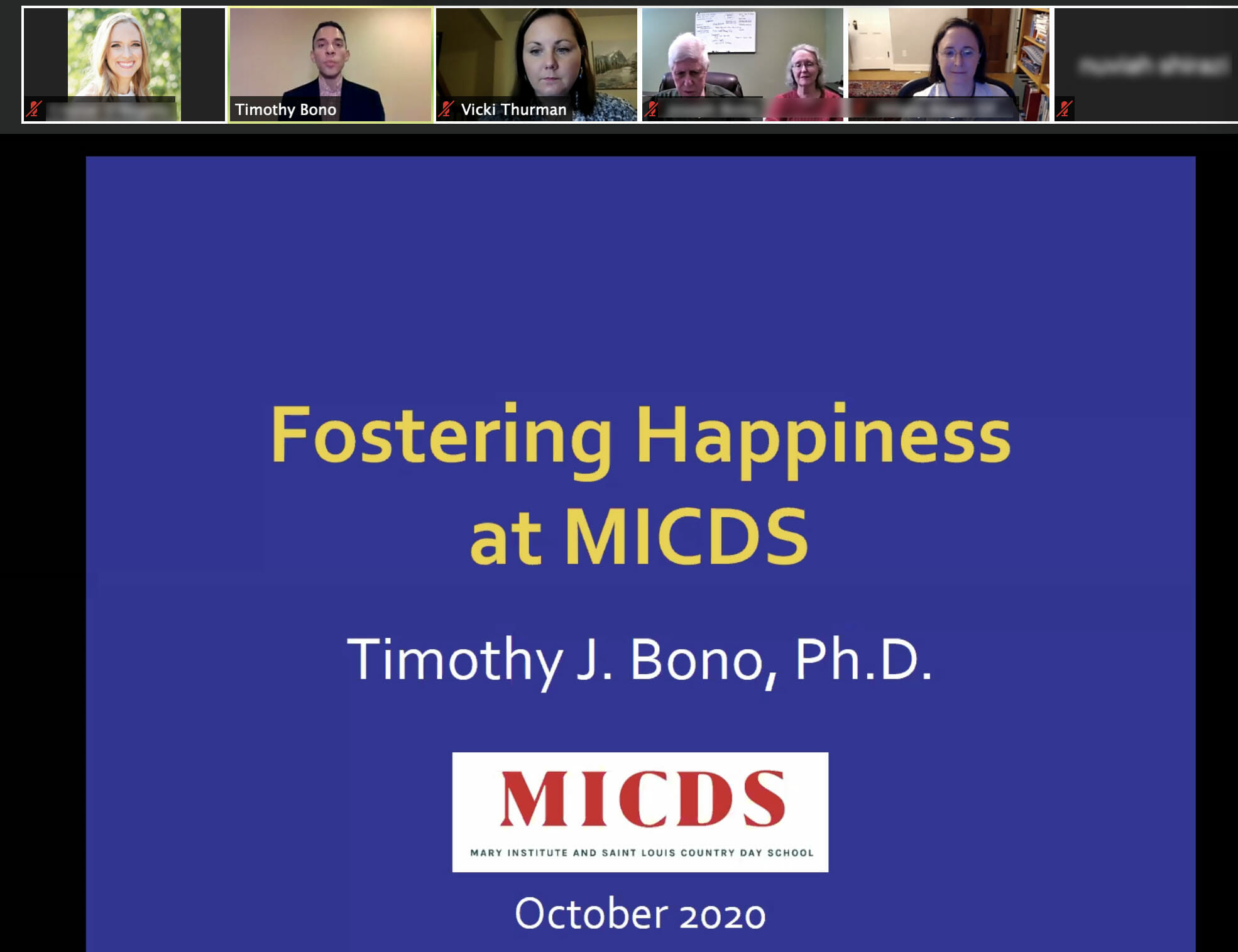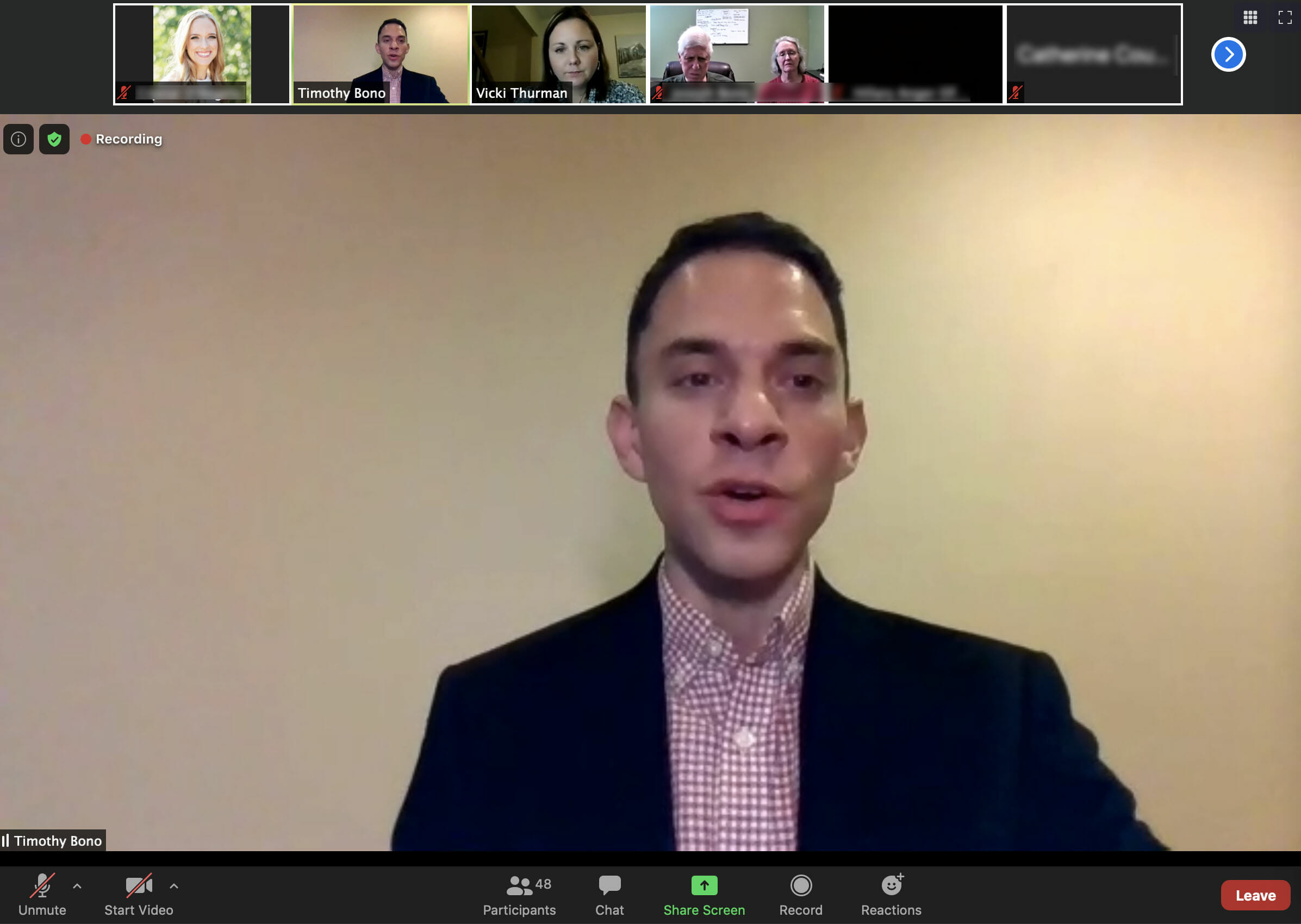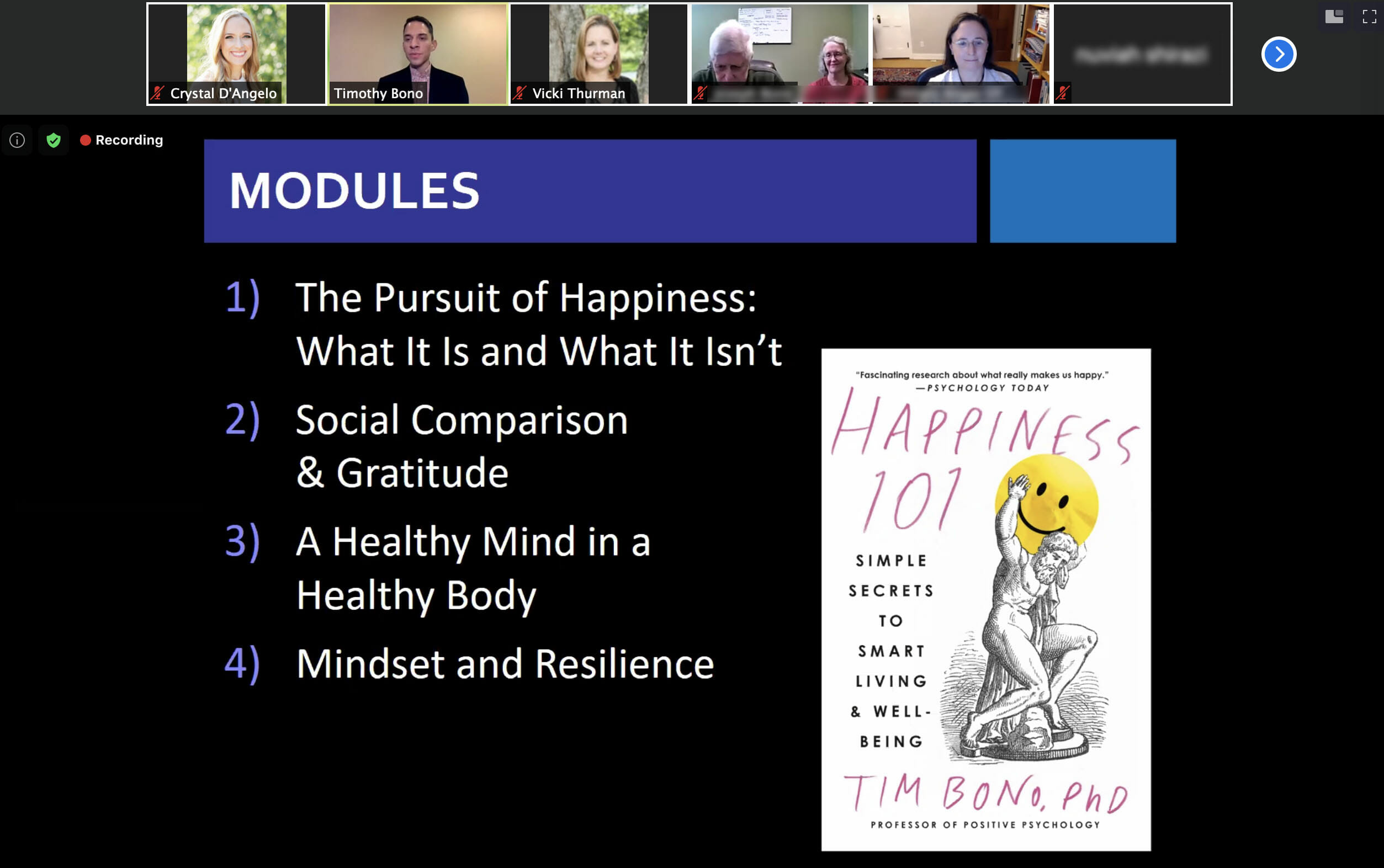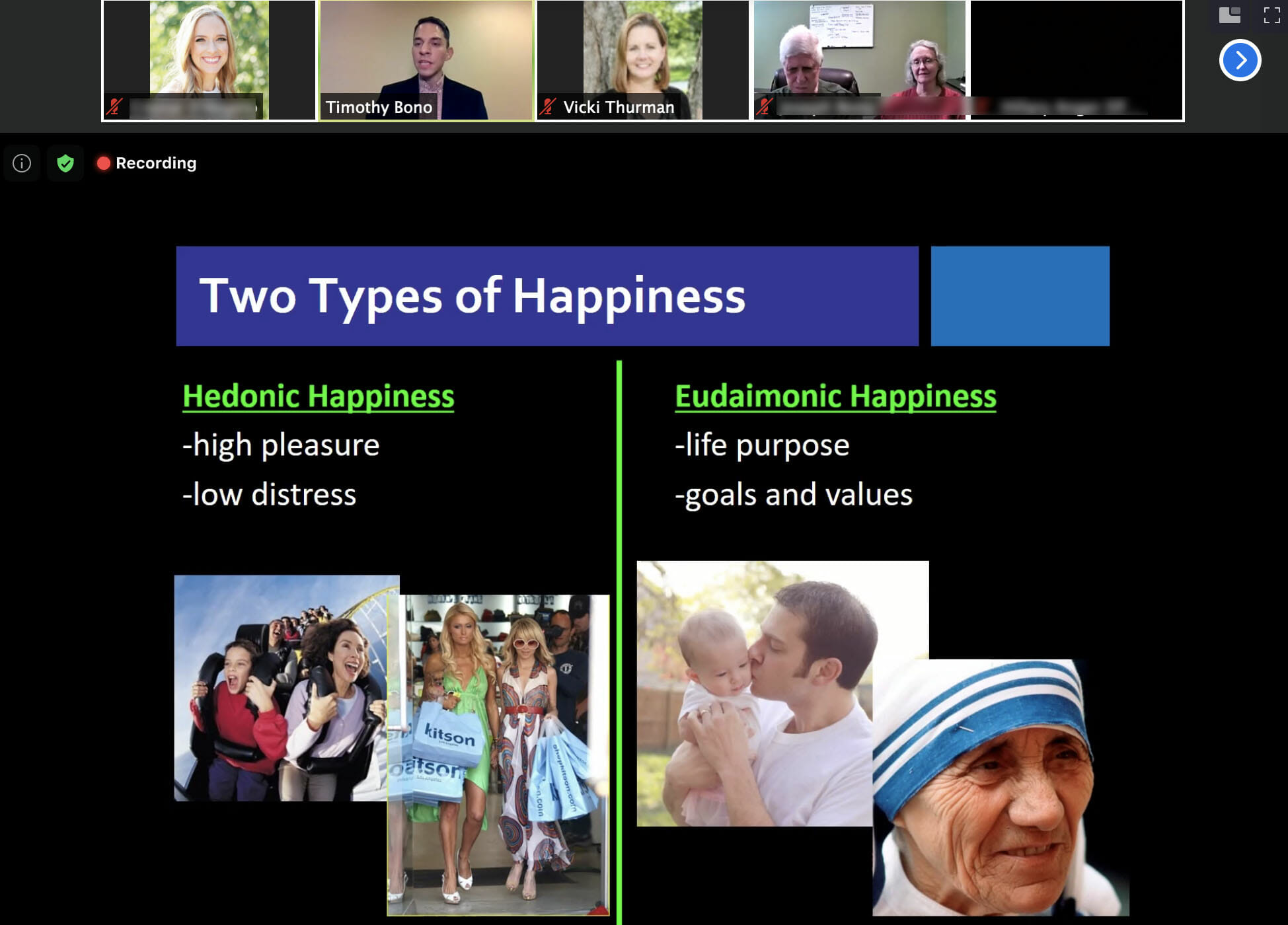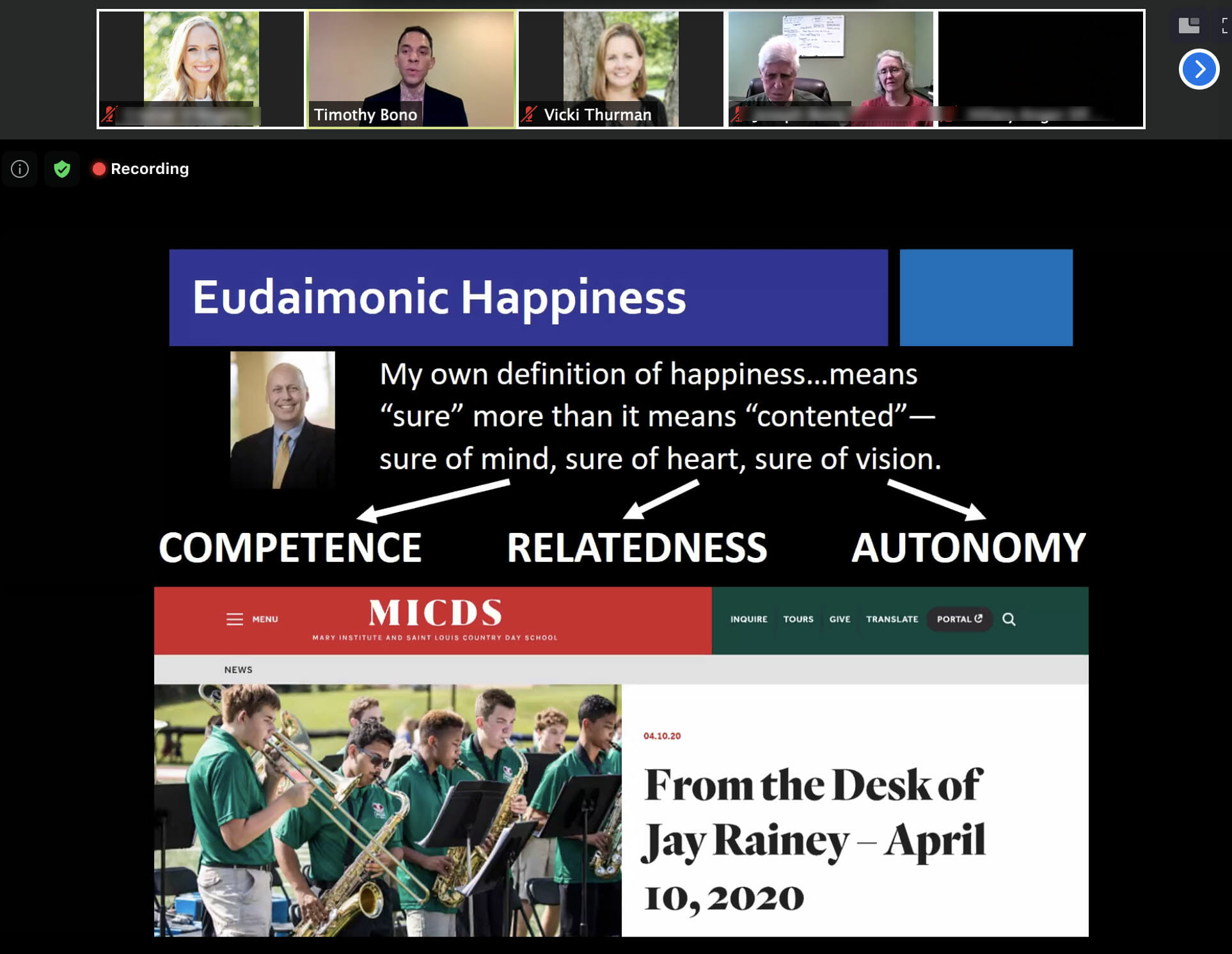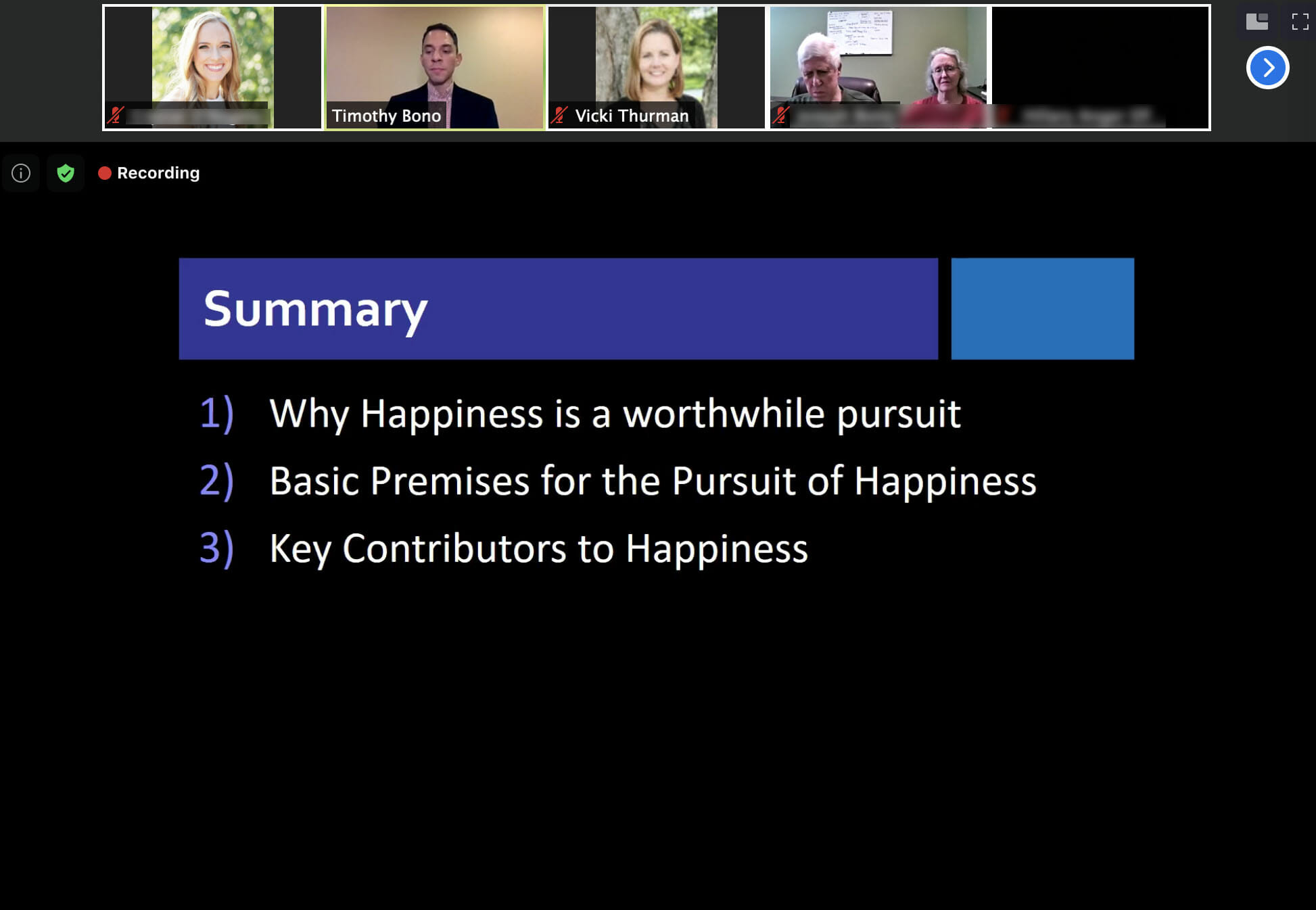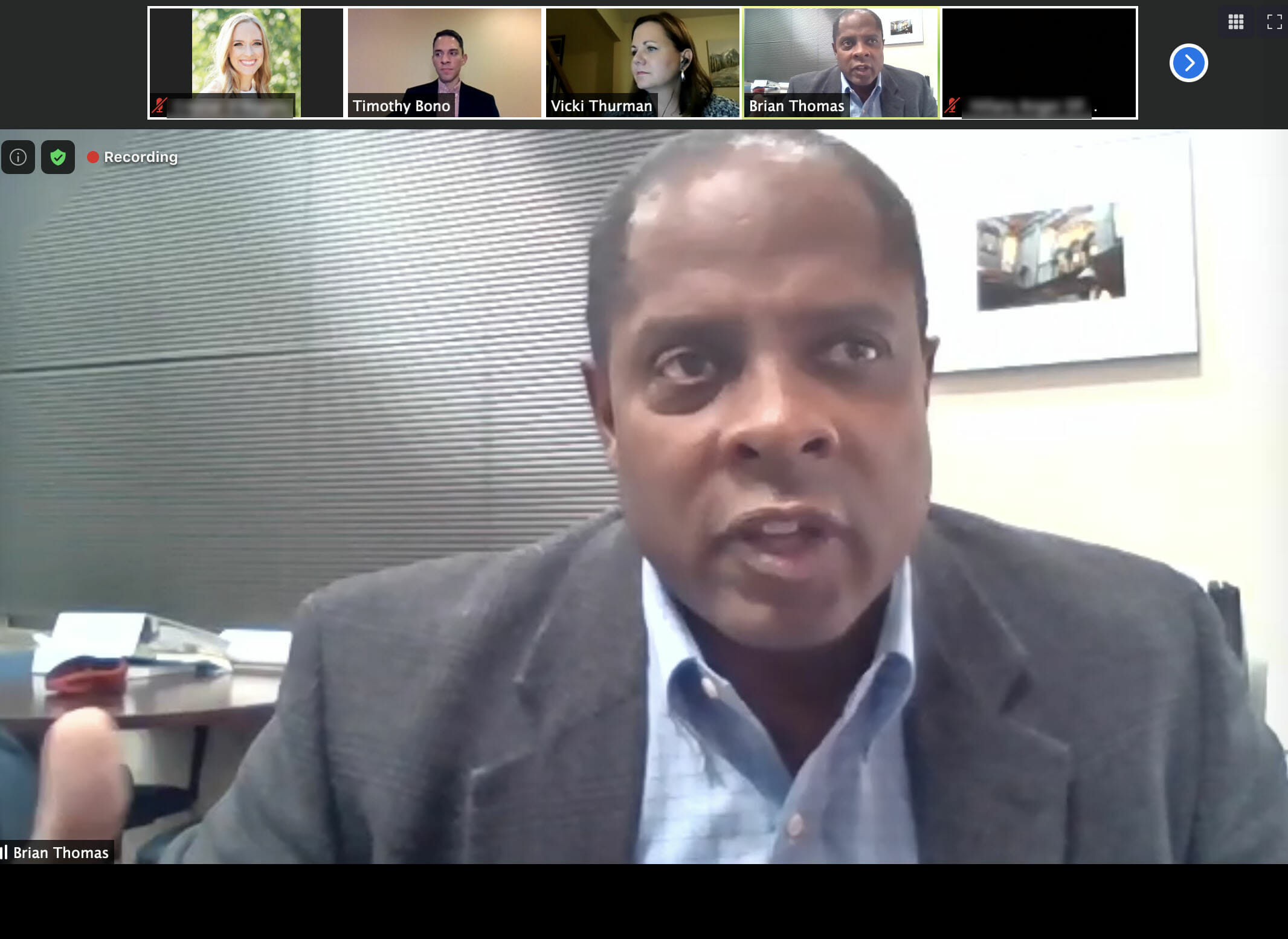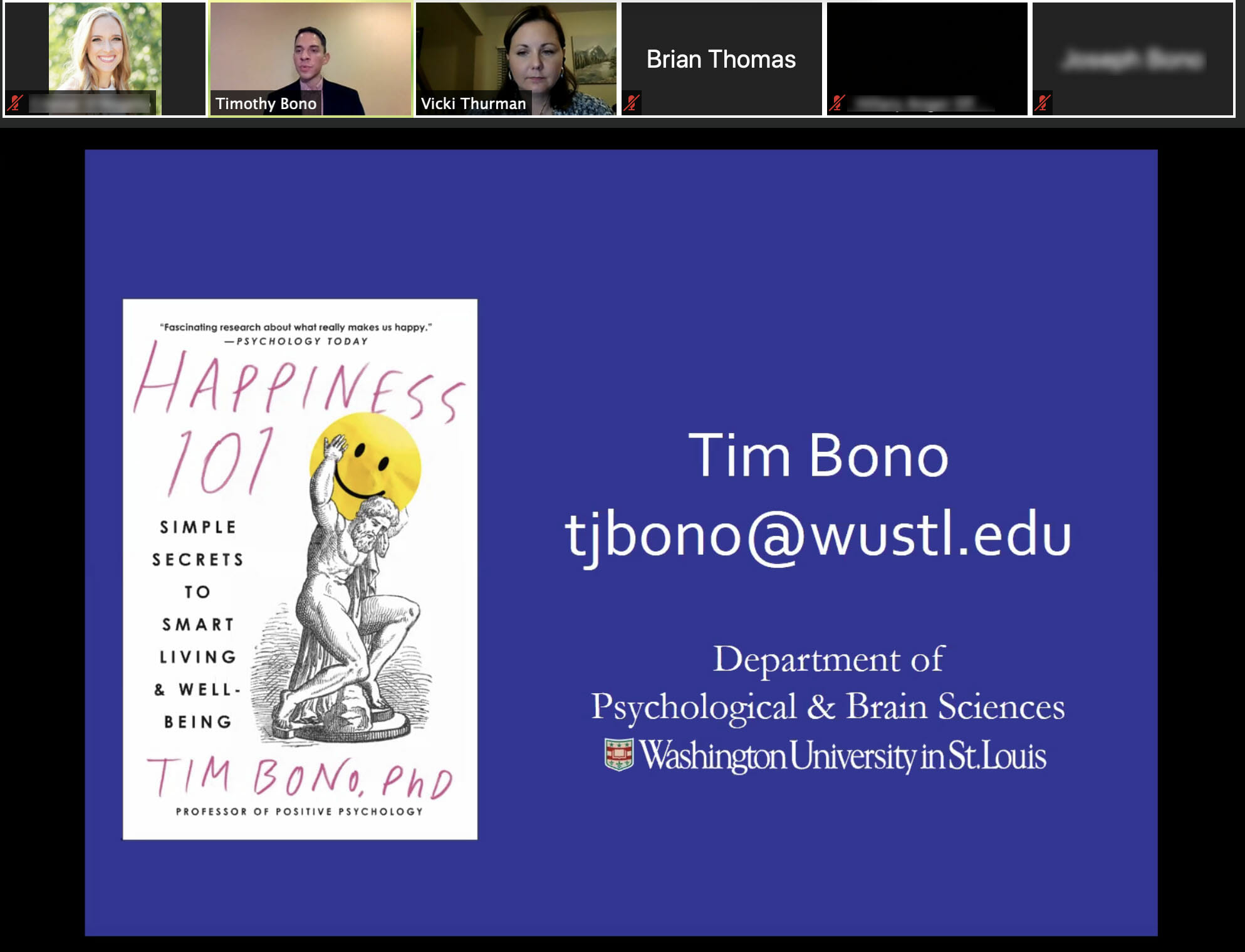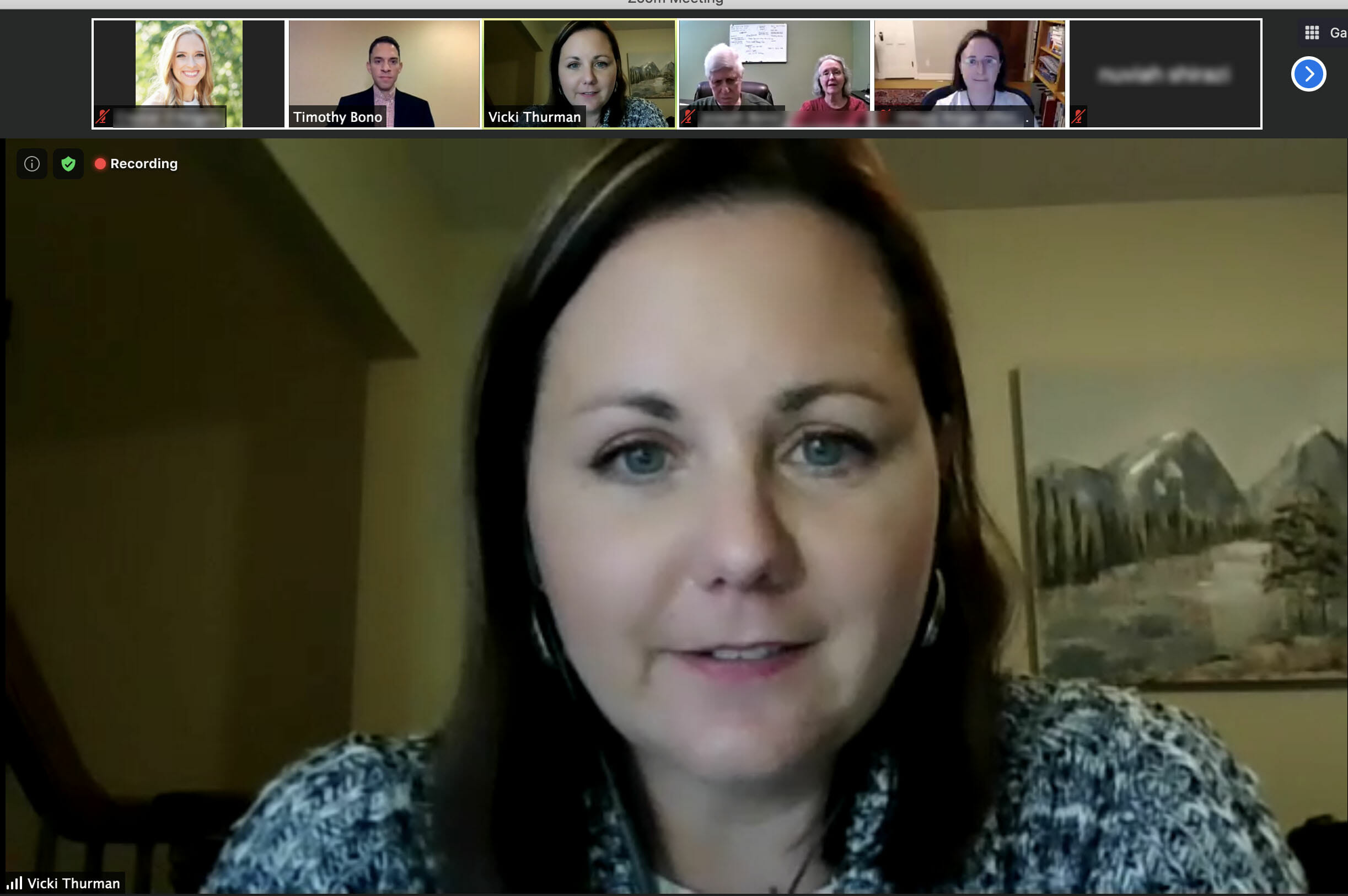On Monday, around 50 MICDS parents and guardians gathered over Zoom for a JK-12 Parent Education Event with Dr. Tim Bono for his presentation called “Fostering Happiness at MICDS: The Role of Parents.” Dr. Bono is a psychologist and lecturer at Washington University and is a frequent speaker at MICDS. He is also an author, most recently publishing Happiness 101: Simple Secrets to Smart Living & Well-Being. On Monday, Dr. Bono led a focus group with parents to get feedback on how we can take concrete steps toward improving the well-being of our students.
This spotlight on happiness at MICDS originated by Head of School Jay Rainey. Embarking on his first year at our School last fall, Mr. Rainey gave himself the charge of making sure MICDS is the happiest school in the area. Taking that baton forward, the Board of Visitors, a group of alumni dedicated to returning to their alma mater to tackle issues and provide feedback, focused on discussing happiness at MICDS last month. Dr. Bono also shared his research and perspective at their recent meetings.
Dr. Bono has developed a series of modules available on the MICDS parent portal inspired by material from his “Science of Happiness” class. The modules cover the following topics:
-
The Pursuit of Happiness
-
Social Comparison and Gratitude
-
A Healthy Mind in a Healthy Body
-
Mindset and Resilience
Monday’s event dove into Dr. Bono’s first module on what the pursuit of happiness is and what it is not. He debunked common myths and outlined key contributors to well-being. As he began, he framed the discussion with two main questions:
- What is the best way to educate/communicate this research to members of the MICDS community?
- How do we actually get students to adopt these strategies and incorporate them into daily life both at school and at home?
First, Dr. Bono talked about why happiness is a worthwhile pursuit. He shared that conventional wisdom uses the “When I achieve ‘X,’ then I will be happier” logic. For example, when you ask teens what they want most out of life, they often say things like good grades, a great job, finding a partner, or becoming successful. When asked why, they say that when they have these things, they will become happy. Bono reversed this conception stating that research actually tells us we’ve been reversing the order. “Instead, happier people are in a position that allows them to achieve these outcomes that are important to them,” he said. “When we are happy, we think more clearly, more broadly, more creatively. We work harder at our jobs. We become more likely to attract other good people to want to be around us. All of which positions us to achieve all of the outcomes that many people identify as what they are looking for in their lives.”
Rather than thinking of happiness as something that makes people feel good in the moment, it’s an emotional characteristic that has many implications for a student’s ability to be successful.
Next, Dr. Bono talked about the basic premises for the pursuit of happiness. First, he wanted to make clear that the pursuit of happiness is not about being happy all of the time. He said to think about our other emotions—anger, sadness, anxiety—as cues about the situation we are in or about our approach to life. As humans, we have a complex set of emotions, and negative emotions are part of being human. Those who tend to spend the largest proportion of their day happy know how to acknowledge that those other emotions are simply a part of life. They don’t see them as signs of something being wrong with them. Additionally, they also develop good coping skills and perseverance for dealing with these other emotions.
So how do we make MICDS as happy a community as we can? We can teach students to identify the full range of human emotions that will come up during the school day and life in general. We can teach them that when they experience sadness or distress, they have skills to know how to persevere. In other words, they are resilient, a skill that many are mastering in this year of the COVID-19 pandemic. “Our goal is not to make anybody happy all the time; it’s to optimize our potential for happiness by reducing the impact of the inevitable bad days,” said Dr. Bono.
The other premise Dr. Bono presented was that the pursuit of happiness is not about becoming happy; it’s about becoming happier. Rather than treat happiness as something that is binary or black and white, he recommended thinking that happiness resides on a continuum. Also, he suggested a few great questions to help think this way:
- Given the things I can’t control, what can I control and do to become happier? After all, there are always circumstances outside of our control that might prevent us from being happy, but, there are also always items within our control to help us be a little bit happier.
- What are the small behaviors and mindsets we and our children can adopt to be happier?
Finally, he talked about the key contributors to happiness and that there are two types of happiness. Hedonic happiness is the happiness that feels good in the moment and reduces our distress (i.e. shopping, riding a roller coaster, etc.). Eudaimonic happiness is the long-lasting happiness you feel when you’re living life according to your true self, aligned with your life purpose, goals, and values (i.e. a young parent with their baby, etc.).
There are three main contributors to eudaimonic happiness:
- Competence – having to work hard and stay on track toward goals that are challenging
- Relatedness – one’s sense of a community (the strongest predictor of happiness in our lives)
- Autonomy – doing things of our own volition based on what’s important to us
Bono closed the presentation portion of his talk with a quote from Mr. Rainey: “My own definition of happiness…means ‘sure’ more than it means ‘contented’—sure of mind, sure of heart, sure of vision.” How fitting that these three items align perfectly with the three contributors to eudaimonic happiness! Making sure students adopt behaviors that build competence, relatedness, and autonomy allows them to increase their sense of happiness and become happier.
Next, Dr. Bono opened up a Q&A session. Here are a few summaries of just a handful of the questions and answers exchanged:
Q: What are the most important things for parents to do to directly impact their children’s happiness?
A: Try to get the child in the habit of reflecting on both the good things going on right now as well as the challenging things. Model this as a parent. Show them it is okay to express sadness and there are strategies to cope and be resilient. Redirect their thinking to positive things in their communities or items they can control so they learn that they do not have to be consumed by sadness.
Q: How do you foresee your research being practically applied to a school setting?
A: The research places importance on community as well as encouraging students to adopt behaviors (getting enough sleep, being grateful, connecting with a friend, using social media responsibly) in small ways during the day that yield to a stronger sense of wellbeing. We also have to be more creative on how we reach out to one another to still foster a sense of community while being safe. At MICDS, Middle and Upper School advisors focus on creating deep connections in their advisories. They practice positive social exchange in programs centered on social emotional learning.
Q: What’s the best way to allow kids to experience their emotions while also having them move forward with problem-solving?
A: Negative emotions can sort of compromise the rest of our brain so that decision-making and problem-solving are even more challenging. Allow kids to talk about their emotions. If it’s too difficult to talk, let them write about their emotions. Ask better questions like, “what’s a path forward?” or “what’s the most likely outcome that could happen?” Perhaps these help the child see a light through a tough experience.
The talk concluded with some reflections from the recent Board of Visitors discussion on happiness. Assistant Head of School Brian Thomas shared emerging research from Dr. Suniya Luthar of Arizona State that indicates the well-being of the adults in a child’s life matters. In other words, it’s important to focus on fostering happiness for our MICDS students and ourselves!
Lastly, Dr. Bono shared that this conversation is only just beginning! We look forward to more discussions on how to make MICDS students happier and happier.
View the full presentation or watch the additional modules by Dr. Tim Bono on the MICDS parent portal.
